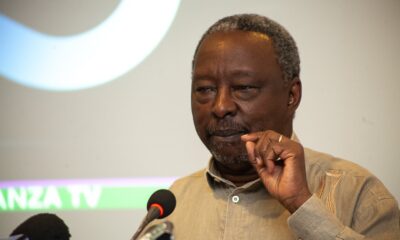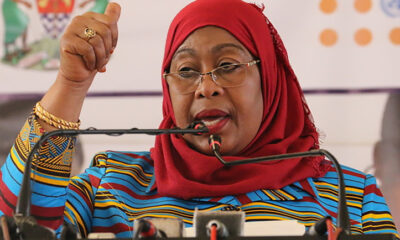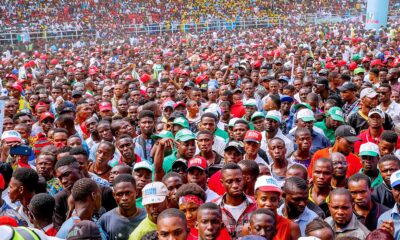Strictly Personal
These are tough times; happy (and not-so-happy) New Year! By Jenerali Ulimwengu
Published
2 years agoon

The pious hopes we habitually exchange around this time every year do have a purpose, and that is mainly to put all our travails to the side and dare to think up new realities we have not been blessed with thus far. So, we hope against hope that this coming twelve months will usher in greater joy than we have had, better lives, and more happiness.
All that is in order, for we are told that those who cannot hope are condemned to be hopeless, and the hopeless are a damned lot. So, let us wish each other a very happy new year and lift our gazes to the horizon to discern our blessings such as they are.
That does not, in any way, excuse us from coming to grips with our lived reality and to recognise our failings, with a view to finding ways to remedy them. And since our problems are legion and cannot be wished away even in a lifetime, let us tackle those we can tackle at a tactical level while we keep in mind those other that we can reserve for more strategic consideration.
In this country, the most pressing problems we have are naturally those we have to consider existential, by which our very survival might be threatened. Even whittled down to the basics, these will remain innumerable. But we can try to name a couple we can identify with a sense of urgency.
Off the top of my head, without necessarily seeking to be alarmist, I see a likely inability to feed ourselves. The rains have been capricious in many of our provinces, not very different than in many of the countries in the neighbourhood, where the “myth” of climate change has taken on a cloak of reality.
To make matters worse, the so-called Ukraine war continues to put a heavy strain on world food and energy supplies, with most devastation felt in our kind of countries and economies.
So, while we take measures to grow our strategic food reserves, we have to watch out against waste at all levels. We have seen for ourselves that food is a finite item, and that it could run out; in certain cases, it has indeed run out. So, it is urgent to protect what we have, as we continue to strive to get more.
One method of this protection is to take concrete measures to wean our people off rainfed food production, by enabling them to collect water by building dams to prevent water from escaping to the ocean, a most silly example of wastefulness.
It is rather funny that people join in congregations praying to the Great Wizard for the rains to come, and when the rains do indeed fall, and in great torrents, they stand around and watch as all that water runs off to the ocean.
However great as an engineer, God does not build dams.
Another point to consider on this trajectory is to show respect for our farmers and peasants, those on the battlefront of food production.
Our rulers have to realise that this category of people is simply the most important group rendering the most vital service to us all. I have for long adopted this useful mantra: If you eat, you are into agriculture.
This reality must be reflected in all our policies and programmes, including budgetary allocations, extension services, and fair pricing structures. It is only a soulless government that sets aside more money for ministers’ SUVs — for sufferers of the Beyoncé syndrome —than for tractors and fertiliser.
This point has been made since forever, but our rulers seem to have stuffed their ears with cotton wool. You just cannot rule over a poor country such as ours and behave with such arrogance and nonchalance.
Looking at the government vehicles and other conspicuous expenditure, we have the most expensive government around, but the same government begs to build pit latrines!
These, then, are the basic problems that we have to grapple with, and at the base must be the realisation that matters are likely to get tougher, not easier. The “Ukraine war” is not ending any time soon, and its effects are likely to have a lasting effect.
We are essentially nations of beggars. Fortunately, those from whom we beg have themselves hit a rough patch, suffering multiple winters of (their own) discontent, exacerbated by Putin’s war. They are not likely to pay heed to our cries of self-inflicted hunger. The “deafness” of the donors — wholly understandable in the circumstance — should be a wake-up call for us to come to our senses and stop behaving like beggars with expensive tastes.
These are tough times, and they are likely to get even tougher, as I have pointed out above. Our government should demonstrate that it is aware of this, and take the requisite measures to soften the impact imposed by these economic realities.
Issues like the Ukraine war are clearly beyond our power, and no one can blame the government for what is happening outside our borders.
But, as I have said, some problems are firmly within our reach, and all that is needed is a little conscience and respect for our people.
With this end-of-year thought, I wish all readers a very Happy and Thinking New Year!
Strictly Personal
Let’s merge EAC and Igad, By Nuur Mohamud Sheekh
Published
1 month agoon
November 27, 2024
In an era of political and economic uncertainty, global crises and diminishing donor contributions, Africa’s regional economic communities (RECs) must reimagine their approach to regional integration.
The East African Community (EAC) and the Intergovernmental Authority on Development (Igad), two critical RECs in East Africa and the Horn of Africa have an unprecedented opportunity to join forces, leveraging their respective strengths to drive sustainable peace and development and advance regional economic integration and promote the African Continental Free Trade Area (AfCFTA).
Already, four of the eight Igad member states are also members of the EAC and, with Ethiopia and Sudan showing interest, the new unified bloc would be formidable.
Igad’s strength lies in regional peacemaking, preventive diplomacy, security, and resilience, especially in a region plagued by protracted conflicts, climate challenges, and humanitarian crises. The EAC, on the other hand, has made remarkable strides in economic integration, exemplified by its Customs Union, Common Market, and ongoing efforts toward a monetary union. Combining these comparative advantages would create a formidable entity capable of addressing complex challenges holistically.
Imagine a REC that pairs Igad’s conflict resolution strengths with the EAC’s diplomatic standing and robust economic framework. Member states of both are also contributing troops to peacekeeping missions. Such a fusion would streamline efforts to create a peaceful and economically prosperous region, addressing the root causes of instability while simultaneously promoting trade investment and regional cooperation.
These strengths will be harnessed to deal with inter-state tensions that we are currently witnessing, including between Ethiopia and Somalia over the Somaliland MoU, strained relations between Djibouti and Eritrea, and the continually deteriorating relations between Eritrea and Ethiopia.
The global economy experienced as a result of the COVID-19 pandemic, compounded by the Ukraine war and competing global crises, has strained donor countries and reduced financial contributions to multilateral organisations and African RECs. Member states, many of which are grappling with fiscal constraints, are increasingly unable to fill this gap, failing to make timely contributions, which is in turn affecting key mandate areas of Igad and EAC, and staff morale.
A merger between Igad and EAC would alleviate this financial pressure by eliminating redundancies. Shared administrative systems, integrated programmes, and a unified leadership structure would optimise resources, enabling the new REC to achieve more with less. Staff rationalisation, while sensitive, is a necessary step to ensure that limited funds are channelled toward impactful initiatives rather than duplicative overheads.
The African Union (AU) envisions a fully integrated Africa, with RECs serving as the building blocks of the AfCFTA. A unified EAC-Igad entity would become a powerhouse for regional integration, unlocking economies of scale and harmonising policies across a wider geographical and economic landscape.
This merger would enhance the implementation of the AfCFTA by creating a larger, more cohesive market that attracts investment, fosters innovation, and increases competitiveness. By aligning trade policies, infrastructure projects, and regulatory frameworks, the new REC could serve as a model for others, accelerating continental integration.
The road to integration is not without obstacles. Political will, divergent institutional mandates, and the complexity of harmonising systems pose significant challenges. However, these hurdles are surmountable through inclusive dialogue, strong leadership, and a phased approach to integration.
Member states must prioritise the long-term benefits of unity over short-term political considerations. Civil society, the private sector, the youth, and international partners also have a critical role to play in advocating for and supporting this transformative initiative.
The time for EAC and Igad to join forces is now. By merging into a single REC, they would pool their strengths, optimise resources, and position themselves as a driving force for regional and continental integration. In doing so, they would not only secure a prosperous future for their citizens and member states but also advance the broader vision of an integrated and thriving Africa.
As the world grapples with crises, Africa must look inward, embracing the power of unity to achieve its potential. A combined Igad-EAC is the bold step forward that the continent needs.
Nuur Mohamud Sheekh, a diplomatic and geopolitical analyst based in London, is a former spokesperson of the Igad Executive Secretary. X: @NuursViews
Strictly Personal
Budgets, budgeting and budget financing, By Sheriffdeen A. Tella, Ph.D.
Published
1 month agoon
November 20, 2024
The budget season is here again. It is an institutional and desirable annual ritual. Revenue collection and spending at the federal, State and local government levels must be authorised and guided by law. That is what budget is all about. A document containing the estimates of projected revenues from identified sources and the proposed expenditure for different sectors in the appropriate level of government. The last two weeks have seen the delivery of budget drafts to various Houses of Assembly and the promise that the federal government would present its draft budget to the National Assembly.
Do people still look forward to the budget presentation and the contents therein? I am not sure. Citizens have realised that these days, governments often spend money without reference to the approved budget. A governor can just wake up and direct that a police station be built in a location. With no allocation in the budget, the station will be completed in three months. The President can direct from his bathroom that 72 trailers of maize be distributed to the 36 states as palliatives. No budget provision, and no discussion by relevant committee or group.
We still operate with the military mentality. We operated too long under the military and of the five Presidents we have in this democracy, two of them were retired military Heads of State. Between them, they spent 16 years of 25 years of democratic governance. Hopefully, we are done with them physically but not mentally. Most present governors grew up largely under military regimes with the command system. That is why some see themselves as emperor and act accordingly. Their direct staff and commissioners are “Yes” men and women. There is need for disorientation.
The importance of budget in the art of governance cannot be overemphasized. It is one of the major functions of the legislature because without the consideration and authorisation of spending of funds by this arm of government, the executive has no power to start spending money. There is what we refer to as a budget cycle or stages. The budget drafting stage within the purview of the executive arm is the first stage and, followed by the authorisation stage where the legislature discusses, evaluates and tinkers with the draft for approval before presenting it to the President for his signature.
Thereafter, the budget enters the execution phase or cycle where programmes and projects are executed by the executive arm with the legislature carrying out oversight functions. Finally, we enter the auditing phase when the federal and State Auditors verify and report on the execution of the budgets. The report would normally be submitted to the Legislature. Many Auditor Generals have fallen victim at this stage for daring to query the executives on some aspects of the execution in their reports.
A new budget should contain the objectives and achievements of the preceding budget in the introduction as the foundation for the budget. More appropriately, a current budget derives its strength from a medium-term framework which also derives its strength from a national Development Plan or a State Plan. An approved National Plan does not exist currently, although the Plan launched by the Muhammadu Buhari administration is in the cooler. President Tinubu, who is acclaimed to be the architect of the Lagos State long-term Plan seems curiously, disillusioned with a national Plan.
Some States like Oyo and Kaduna, have long-term Plans that serve as the source of their annual budgets. Economists and policymakers see development plans as instruments of salvation for developing countries. Mike Obadan, the former Director General of the moribund Nigeria Centre for Economic and Management Administration, opined that a Plan in a developing country serves as an instrument to eradicate poverty, achieve high rates of economic growth and promote economic and social development.
The Nigerian development plans were on course until the adoption of the World Bank/IMF-inspired Structural Adjustment Programme in 1986 when the country and others that adopted the programme were forced to abandon such plan for short-term stabilisation policies in the name of a rolling plan. We have been rolling in the mud since that time. One is not surprised that the Tinubu administration is not looking at the Buhari Development Plan since the government is World Bank/IMF compliant. It was in the news last week that our President is an American asset and by extension, Nigeria’s policies must be defined by America which controls the Bretton Woods institutions.
A national Plan allows the citizens to monitor quantitatively, the projects and programmes being executed or to be executed by the government through the budgeting procedure. It is part of the definitive measures of transparency and accountability which most Nigerian governments do not cherish. So, you cannot pin your government down to anything.
Budgets these days hardly contain budget performance in terms of revenue, expenditure and other achievements like several schools, hospitals, small-scale enterprises, etc, that the government got involved in successfully and partially. These are the foundation for a new budget like items brought forward in accounting documents. The new budget should state the new reforms or transformations that would be taking place. Reforms like shifting from dominance of recurrent expenditure to capital expenditure; moving from the provision of basic needs programmes to industrialisation, and from reliance on foreign loans to dependence on domestic fund mobilisation for executing the budget.
That brings us to the issue of budget deficit and borrowing. When an economy is in recession, expansionary fiscal policy is recommended. That is, the government will need to spend more than it receives to pump prime the economy. If this is taken, Nigeria has always had a deficit budget, implying that we are always in economic recession. The fact is that even when we had a surplus in our balance of payment that made it possible to pay off our debts, we still had a deficit budget. We are so used to borrowing at the national level that stopping it will look like the collapse of the Nigerian state. The States have also followed the trend. Ordinarily, since States are largely dependent on the federal government for funds, they should promote balanced budget.
The States are like a schoolboy who depends on his parents for school fees and feeding allowance but goes about borrowing from classmates. Definitely, it is the parents that will surely pay the debt. The debt forgiveness mentality plays a major role in the process. Having enjoyed debt forgiveness in the past, the federal government is always in the credit market and does not caution the State governments in participating in the market. Our Presidents don’t feel ashamed when they are begging for debt forgiveness in international forum where issues on global development are being discussed. Not less than twice I have watched the countenance of some Presidents, even from Africa, while they looked at our president with disdain when issues of debt forgiveness for African countries was raised.
In most cases, the government, both at the federal and state cannot show the product of loans, except those lent by institutions like the World Bank or African Development Bank for specific projects which are monitored by the lending institutions. In other cases, the loans are stolen and transferred abroad while we are paying the loans. In some other cases, the loans are diverted to projects other than what the proposal stated. There was a case of loans obtained based on establishing an international car park in the border of the State but diverted to finance the election of a politician in the State. The politician eventually lost the election but the citizens of the State have to be taxed to pay the loan. Somebody as “Nigeria we hail thee”.
Transformation in budgeting should commence subsequently at the State and federal level. Now that local government will enjoy some financial autonomy and therefore budgeting process, they should be legally barred from contracting foreign loans. They have no business participating in the market. They should promote balanced budget where proposed expenditures must equal the expected revenues from federal and internal sources. The State government that cannot mobilise, from records, up to 40 percent of its total budget from IGR should not be supported to contract foreign loans. The States should engage in a balanced budget. The federal government budget should shift away from huge allocations to recurrent expenditure towards capital expenditure for capital formation and within the context of a welfarist state.
Sheriffdeen A. Tella, Ph.D.
EDITOR’S PICK


Niger citizen knocks President Tchiani for neglecting critical issues at home to peddle rumours against Nigeria
A citizen of Niger Republic has slammed the country’s military leader, President Abdourahmane Tchiani, for neglecting critical issues facing the...


Moroccan tourist arrivals hit record-breaking 16 million
The year 2024 has seen Morocco celebrate a record-breaking 16 million tourist arrivals, surpassing the 12 million mark set in...


Safaricom Ethiopia launches 4G network in Gambella
Ethiopia’s second largest telecom provider, Safaricom Telecommunications Ethiopia P.L.C., has announced the official launching of its 4G network services in...


Dumping England for Nigeria the best decision of my life— Ademola Lookman
Current African Men’s Footballer of the Year, Ademola Lookman, has attributed his rise in the football echelon to his decision...


Zambian NGOs rate President Hichilema’s reforms as not far-reaching
Two Non-Governmental Organizations (NGOs) in Zambia, the Transparency International-Zambia (TI-Z) and the Continental Leadership Research Institute (CLRI), have rated the...
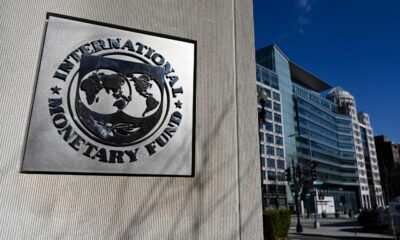

IMF, Egypt reach agreement for fourth review of Egypt’s $1.2 billion loan request
Egypt and the International Monetary Fund (IMF) have reached a staff-level agreement over the fourth review of the Extended Fund...


Libya’s eastern govt accepts petrol subsidy elimination
In a recent statement, the eastern government of Libya claimed it had reached a consensus on a plan to eliminate...


World Bank suspends loan fees for impoverished countries
To lower borrowing costs for vulnerable nations, the World Bank has announced the elimination of several loan fees. The action...
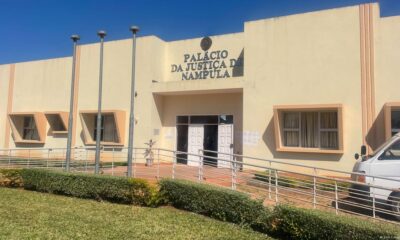

Mozambique’s top court affirms governing party’s victory in recent election
The highest court in Mozambique affirmed Monday that the incumbent Frelimo party won the October election, sparking widespread demonstrations from...


Nigeria resumes mining in Zamfara state
According to the mining minister, Nigeria has removed a five-year restriction on mining exploration in the northwest state of Zamfara,...
Trending
-

 Politics2 days ago
Politics2 days agoMozambique’s top court affirms governing party’s victory in recent election
-

 VenturesNow2 days ago
VenturesNow2 days agoLibya’s eastern govt accepts petrol subsidy elimination
-

 VenturesNow2 days ago
VenturesNow2 days agoNigeria resumes mining in Zamfara state
-

 Metro2 days ago
Metro2 days agoZambian NGOs rate President Hichilema’s reforms as not far-reaching


